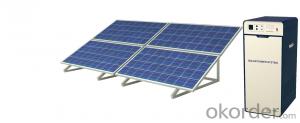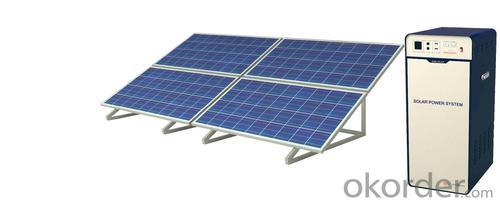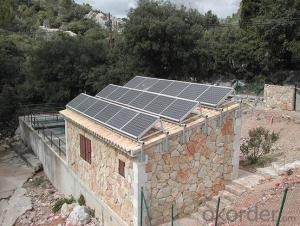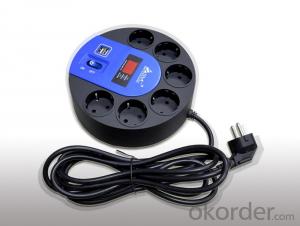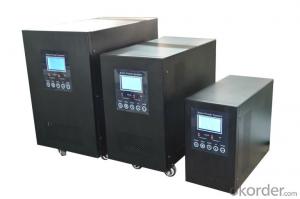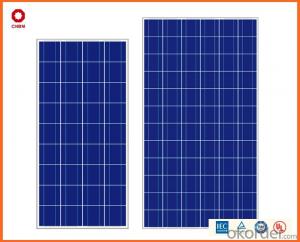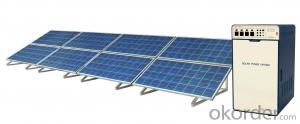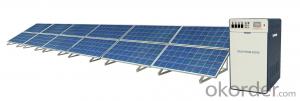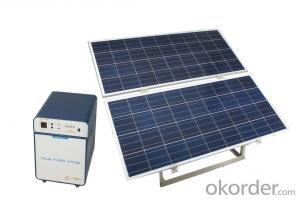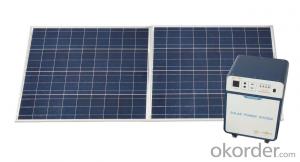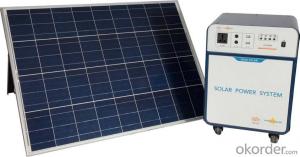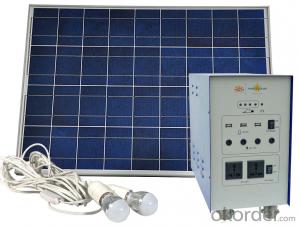Suntec Solar Energy Systems Off-Grid Solar Power System JS-SPS-1000
- Loading Port:
- Tianjin
- Payment Terms:
- TT OR LC
- Min Order Qty:
- 10 set
- Supply Capability:
- 10000 set/month
OKorder Service Pledge
Quality Product, Order Online Tracking, Timely Delivery
OKorder Financial Service
Credit Rating, Credit Services, Credit Purchasing
You Might Also Like
General Introduction
Solar power system provides alternating current and direct current, which is produced by the modules transforming solar power into power, to home lighting, household appliance and other DC appliance, such as cell phone and laptop.
Solar power system is widely used in area lack of power, for example house power supplying, monitoring, communication base, fire prevention in forest area, pasture and meadow, aquaculture etc.
We are dedicated to provide high quality off-grid PV products and systems to customers and has received a series of certificate, including ISO9001, TUV, UL, CE, CQC and RoHS.
Off-grid Solar Power System
High efficent PV module can produce more power.
Sine wave output is suitable for all kinds of load. Varieties of DC output, let it more
convenient for users.
The multifunction design make it easy to operation and maintenance.
Solar power system provides alternating current and direct current, which is produced by the modules transforming solar power into power, to home lighting, household appliance and other DC appliance, such as cell phone and laptop.
Solar power system is widely used in area lack of power, for example house power supplying, monitoring, communication base, fire prevention in forest area, pasture and meadow, aquaculture etc.
We are dedicated to provide high quality off-grid PV products and systems to customers and has received a series of certificate, including ISO9001, TUV, UL, CE, CQC and RoHS.
Off-grid Solar Power System
High efficent PV module can produce more power.
Sine wave output is suitable for all kinds of load. Varieties of DC output, let it more
convenient for users.
The multifunction design make it easy to operation and maintenance.
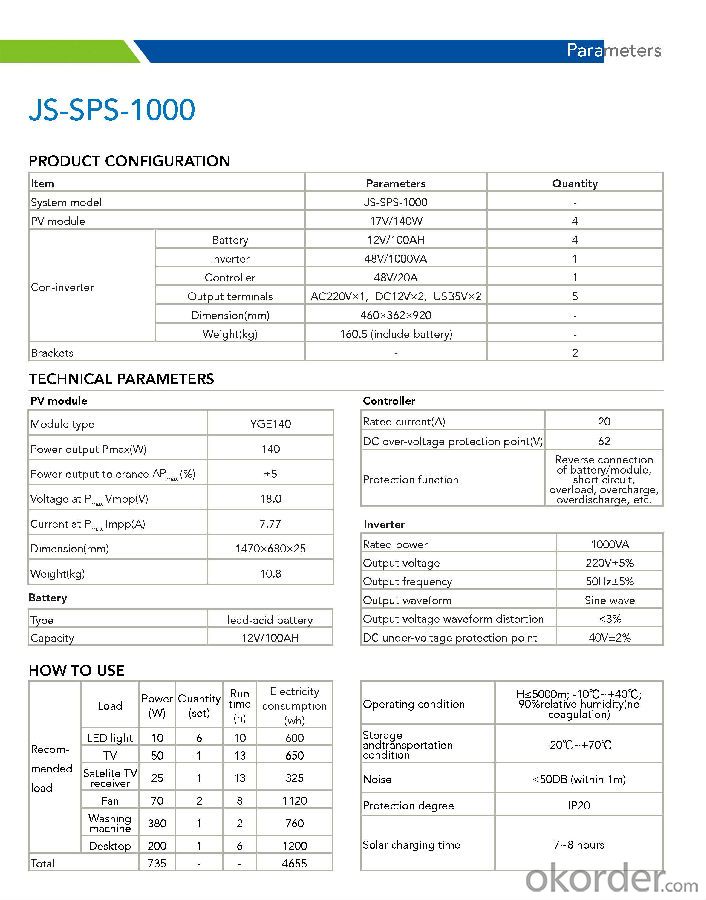
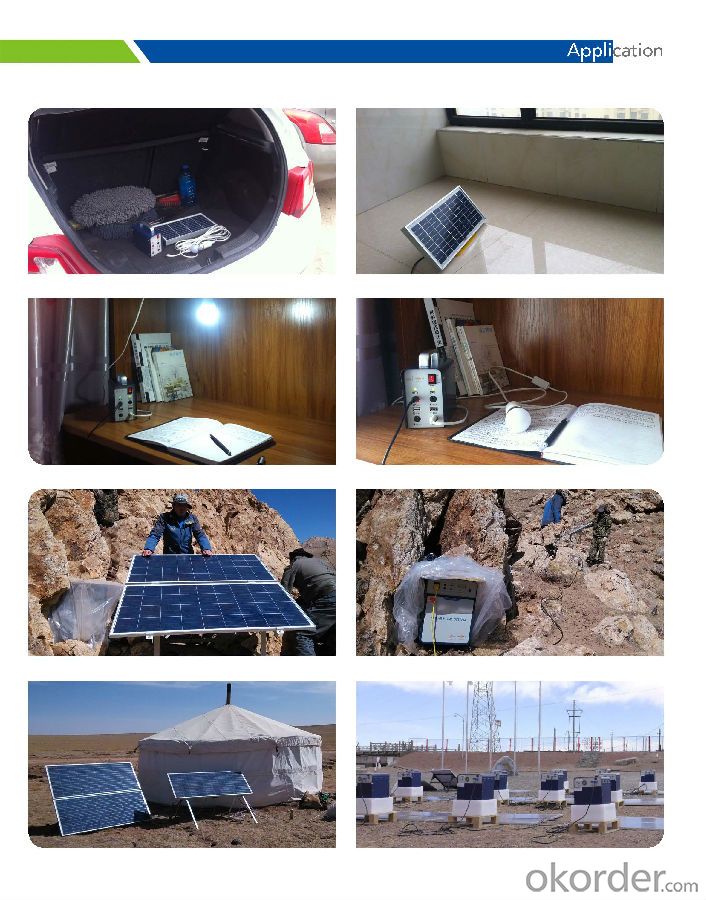
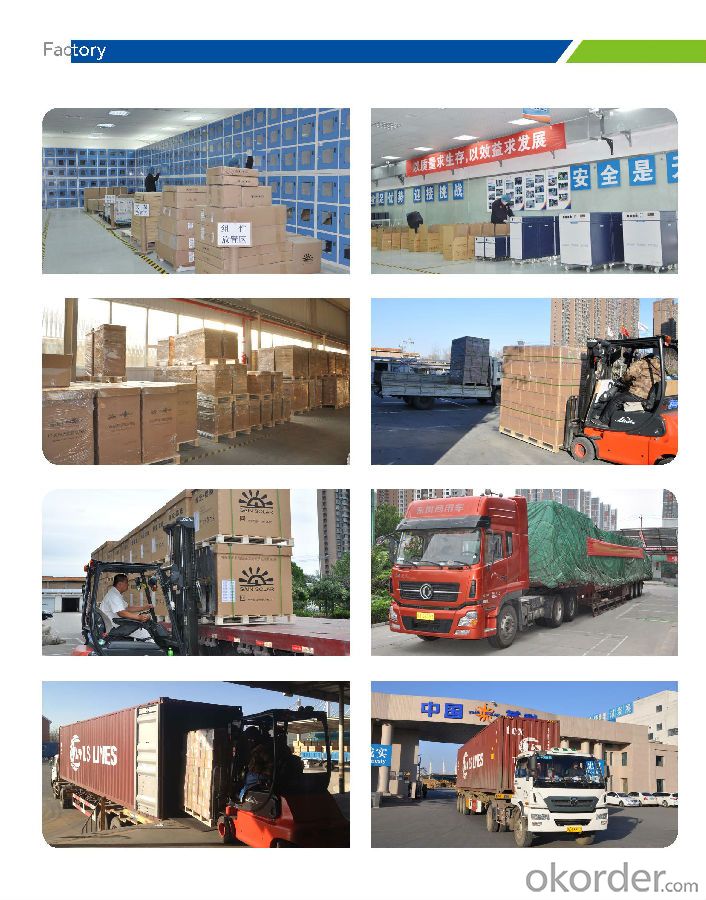
- Q: How does the efficiency of solar panels vary with temperature?
- The efficiency of solar panels varies inversely with temperature. As the temperature increases, the efficiency of solar panels decreases. This is because solar panels work by converting sunlight into electricity through the photovoltaic effect. When the temperature rises, the electrons in the solar cells gain more energy, which can lead to an increase in electron movement and resistance within the panel. The efficiency of solar panels is typically measured by their power output in relation to the amount of sunlight received. As the temperature rises, the power output of solar panels tends to decrease, resulting in reduced efficiency. This decrease in efficiency is known as the temperature coefficient. The temperature coefficient represents the percentage change in power output for every degree Celsius increase in temperature. It is usually expressed as a negative value, indicating the decrease in efficiency as the temperature rises. Different types of solar panels have different temperature coefficients, which can range from -0.2% to -0.5% per degree Celsius. To counter the decrease in efficiency caused by higher temperatures, solar panels are often designed with cooling mechanisms or placed in locations with good ventilation. These measures help dissipate excess heat and maintain a more favorable operating temperature, thereby improving the overall efficiency of the solar panels. In summary, the efficiency of solar panels decreases with increasing temperature due to the temperature coefficient. It is important to consider temperature effects when designing solar panel systems and implement measures to mitigate the decrease in efficiency caused by higher temperatures.
- Q: Can a solar energy system be installed in areas with high winds?
- Yes, a solar energy system can be installed in areas with high winds. However, it is crucial to take into account the wind load and design the system accordingly. Solar panels are designed to withstand various weather conditions, including strong winds, but they need to be properly mounted and secured to ensure their stability. Additionally, using aerodynamic mounting systems and tilt mechanisms can help reduce the impact of high winds on the solar panels. It is recommended to consult with a professional installer who can assess the specific wind conditions in the area and provide appropriate solutions to ensure the system's durability and performance.
- Q: Can solar energy systems be used in mining operations?
- Yes, solar energy systems can be used in mining operations. Solar power can be harnessed to generate electricity for various mining activities, such as powering equipment, lighting, and ventilation systems. It offers a sustainable and cost-effective alternative to traditional fossil fuel-based energy sources, reducing both operational costs and environmental impact. Additionally, solar energy systems can be easily deployed in remote mining sites where grid electricity may be unavailable or expensive to access.
- Q: Can solar energy systems be used in powering community centers or social organizations?
- Absolutely, community centers or social organizations can definitely utilize solar energy systems to power their facilities. Solar energy is an eco-friendly and renewable power source that can cater to various electricity needs such as lighting, heating, and running electrical appliances. To meet the electricity requirements of their members or visitors, community centers and social organizations often consume a significant amount of energy. By installing solar panels on their rooftops or in nearby open spaces, these organizations can generate their own electricity and reduce their reliance on the traditional power grid. One of the major advantages of utilizing solar energy systems is the long-term cost savings they offer. Although the initial installation costs may be higher compared to conventional power sources, solar panels have a lifespan of 25-30 years and entail minimal maintenance. Consequently, over time, the investment made in solar energy systems can be recouped through reduced electricity bills. Additionally, solar energy systems are environmentally friendly as they produce no greenhouse gas emissions during operation. By harnessing solar power, community centers and social organizations can play a role in mitigating climate change and diminishing their carbon footprint. In areas prone to frequent power outages, solar energy systems can provide a reliable source of electricity. By incorporating battery storage systems, excess solar energy can be stored and utilized during periods of low or no sunlight, ensuring uninterrupted power supply to the community center or social organization. Furthermore, solar energy systems can serve as an educational tool for social organizations to raise awareness about renewable energy and sustainability. By showcasing the advantages and viability of solar power, these organizations can inspire community members to consider adopting clean energy solutions in their own homes and businesses. In conclusion, solar energy systems are a feasible and sustainable option for powering community centers or social organizations. They offer cost savings, environmental benefits, reliability, and educational opportunities. By embracing solar power, these organizations can set an example and contribute to a more sustainable future.
- Q: Can solar energy systems be used in disaster relief efforts?
- Yes, solar energy systems can definitely be used in disaster relief efforts. These systems are portable, easy to set up, and can provide a reliable source of electricity in areas where the traditional power grid might be damaged or inaccessible. Solar energy systems can power medical equipment, communication devices, lighting, and other essential needs, thereby aiding relief operations and helping affected communities recover faster. Moreover, solar energy systems have the added advantage of being renewable and environmentally friendly, reducing reliance on fossil fuels during already challenging times.
- Q: Can solar energy systems be used for powering off-grid manufacturing facilities?
- Yes, solar energy systems can be used to power off-grid manufacturing facilities. Solar panels can be installed on the facility's roof or in nearby open areas to generate electricity from sunlight. This electricity can then be used to power the manufacturing processes, machinery, and equipment, reducing the reliance on traditional grid power. Additionally, with energy storage solutions like batteries, solar power can be stored and used during non-sunlight hours, ensuring a continuous power supply to the facility.
- Q: Can solar energy systems be used in areas with limited access to backup systems?
- Yes, solar energy systems can be used in areas with limited access to backup systems. Solar energy systems, such as solar panels, can generate electricity during the day by harnessing the sun's energy. This electricity can be used directly to power devices or stored in batteries for later use, providing a reliable source of energy even in areas with limited access to backup systems or unreliable grid infrastructure. Additionally, advancements in solar technology have made off-grid solar systems more efficient and affordable, making them a viable option for powering remote areas or locations with limited or no access to traditional backup systems.
- Q: Can solar energy systems be used for emergency response operations?
- Yes, solar energy systems can be used for emergency response operations. Solar power can provide a reliable source of electricity during emergencies, ensuring critical operations such as communication, lighting, medical equipment, and water pumping are sustained. These systems are portable, easy to deploy, and do not rely on an external power grid, making them suitable for remote or disaster-stricken areas. Additionally, solar energy is a clean and renewable resource, reducing reliance on fossil fuels and minimizing environmental impact during emergency operations.
- Q: What is the role of solar charge controllers in regulating the charging of batteries?
- The role of solar charge controllers is to regulate the charging of batteries by controlling the flow of electricity from the solar panels to the batteries. They ensure that the batteries are charged efficiently and safely by monitoring and adjusting the voltage and current levels. This helps prevent overcharging, which could damage the batteries, and also prevents over-discharging, which could lead to reduced battery life. Solar charge controllers also provide protection against voltage spikes, reverse current flow, and other potential issues, ensuring optimal charging and prolonging the lifespan of the batteries.
- Q: Are there any risks of electrical grounding issues with solar energy systems?
- Yes, there can be risks of electrical grounding issues with solar energy systems. Improper grounding or lack of proper grounding can lead to electrical shocks, system malfunctions, and even fire hazards. It is crucial to ensure that solar panels, inverters, and other electrical components are correctly grounded to minimize these risks and ensure the safe and efficient operation of the system.
Send your message to us
Suntec Solar Energy Systems Off-Grid Solar Power System JS-SPS-1000
- Loading Port:
- Tianjin
- Payment Terms:
- TT OR LC
- Min Order Qty:
- 10 set
- Supply Capability:
- 10000 set/month
OKorder Service Pledge
Quality Product, Order Online Tracking, Timely Delivery
OKorder Financial Service
Credit Rating, Credit Services, Credit Purchasing
Similar products
Hot products
Hot Searches
Related keywords
